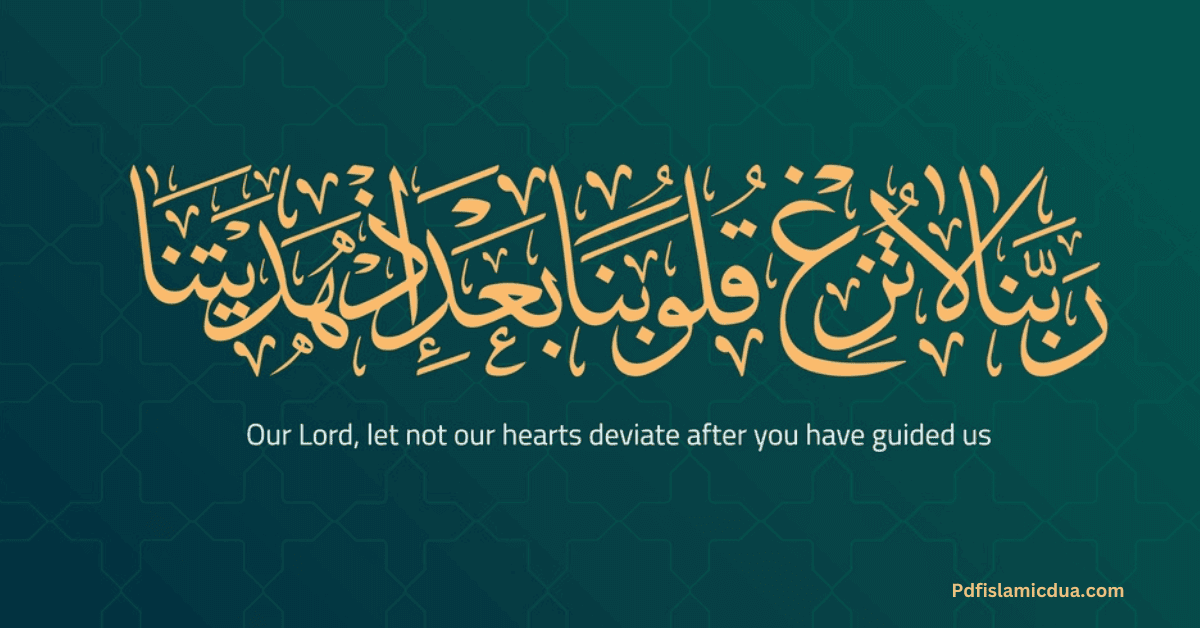Blog
Dua & Surah PDF
rabbana dua, rabbana la tuzig quloobana, rabbana la tuzigh, rabbana la tuzigh dua, rabbana la tuzigh quloobana, rabbana la tuzigh quloobana ayat, rabbana la tuzigh quloobana dua, rabbana la tuzigh quloobana dua in arabic, rabbana la tuzigh quloobana dua meaning, rabbana la tuzigh quloobana dua urdu translation, rabbana la tuzigh quloobana surah, rabbana la tuzigh quloobana with urdu translation, rabbana la tuzigh qulubana
pdfislamicdua
0 Comments
Rabbana laa tuzigh kuloobana Dua Meaning Arabic text
“Rabbana laa tuzigh kuloobana Dua ” is a powerful supplication from Surah Al-Imran (3:8), where we ask Allah (SWT) not to let our hearts deviate after He has guided us. This verse reflects our dependence on Allah’s guidance, acknowledging that only He can keep us steadfast on the right path. It is a reminder of Allah’s mercy and generosity in guiding His servants.
Rabbana laa tuzigh kuloobana Dua Meaning Arabic text
| Arabic | Transliteration | Meaning |
|---|---|---|
| رَبَّنَا لاَ تُزِغْ قُلُوبَنَا بَعْدَ إِذْ هَدَيْتَنَا وَهَبْ لَنَا مِن لَّدُنكَ رَحْمَةً إِنَّكَ أَنتَ الْوَهَّابُ | Rabbana la tuzigh quloobana ba’da idh hadaitana wa hab lana milladunka rahmah innaka antal Wahhab | “Our Lord, let not our hearts deviate after You have guided us and grant us from Yourself mercy. Indeed, You are the Bestower.” |
Recent Posts
- Surah Ash-Sharh in Arabic English and Meaning
- Surah Al Balad Word by Word With English Translation
- Dua for Guidance in Times of Confusion-Salat al-Istikhara
- Surah Al-Fajr PDF Translation and Transliteration
- Surah Ad-Duha Translation and Recitation-PDF
Hadith Related to the Rabbana laa tuzigh Dua
Shahr bin Hawshab said:
“I said to Umm Salamah: ‘O Mother of the Believers! What was the supplication that the Messenger of Allah (ﷺ) said most frequently when he was with you?” She said: ‘The supplication he said most frequently was: “O Changer of the hearts, make my heart firm upon Your religion (Yā Muqallibal-qulūb, thabbit qalbī alā dīnik).”* She said: *‘So I said: “O Messenger of Allah, why do you supplicate so frequently: ‘O Changer of the hearts, make my heart firm upon Your religion’He said: ‘O Umm Salamah! Verily, there is no human being except that his heart is between Two Fingers of the Fingers of Allah, so whomsoever He wills He makes steadfast, and whomever He wills He causes to deviate.” —
Benefits of Reciting “Rabbana Laa Tuzigh Quloobana”
- Strengthens Faith: Reciting this Dua regularly helps us remember to ask Allah for guidance, which strengthens our faith and trust in Him.
- Protects from Misguidance: This dua acts like a shield, asking Allah to keep our hearts safe from going astray or falling into doubts.
- Increases Awareness: It reminds us how fragile our hearts can be, and how much we need Allah’s mercy to stay on the right path.
- Teaches Humility: By recognizing that only Allah can guide us, we learn to be humble and submit to His will.
- Protection from Trials: By reciting this Dua, believers seek refuge from challenging trials (fitnah) that might lead them away from righteousness.
- True Faith and Understanding: The Dua seeks the strength to truly embrace and believe in the Quran, including its clear and subtle teachings.
- Steadfastness in Faith: It asks Allah for the power to remain steady and firm in belief, acknowledging the Quran and Prophets’ teachings as truth.
- Correct Interpretation: This prayer seeks a proper understanding of the more complex verses of the Quran, avoiding any misinterpretations or errors.
About Surah Al Imaran
In Surah Al Imran, verse 8, Allah shares a powerful supplication from the Rāsikhoona—those who are firmly grounded in knowledge. They pray, “Our Lord! Let not our hearts deviate (from the truth) after You have guided us, and grant us mercy from You. Truly, You are al-Wahhab (the One Who Gives Freely).” This dua highlights several key themes:
Acknowledgment of All Quranic Verses: The Rāsikhoona believe in both the Mutashābih (unclear) and Muhkam (clear) verses, affirming their acceptance of all parts of the Quran.
Protection from Misinterpretation: They seek Allah’s refuge from the trial of deviation, specifically from misinterpreting unclear verses for selfish aims, which leads others astray.
Firmness on the Truth: They ask Allah to keep their hearts steadfast on the truth, recognizing that only He fully understands the Quran’s unclear verses.
Request for Mercy and Steadfastness: By asking for mercy, they seek Allah’s help to remain true to the Quran and the Prophet’s teachings, acknowledging Allah’s generosity in keeping their hearts aligned with righteousness.
Emphasis on Allah as al-Wahhab: The name al-Wahhab, meaning “the One Who Gives Freely,” underlines Allah’s generosity in providing His followers with the strength to stay committed to His guidance.
This dua represents humility, gratitude, and a sincere desire to remain on the right path.














Post Comment